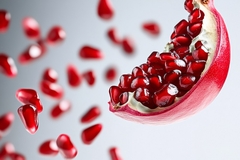Pomegranate polyphenols help boost longevity, new research finds
Key takeaways
- A clinical study links Euromed’s Pomanox pomegranate extract to an improved key biomarker of healthy aging.
- Pomanox increased levels of the IGF-1 hormone, which is linked to better muscle function, metabolic health, and vascular integrity.
- The same trial also showed that Pomanox helped reduce markers of inflammation and lower systolic blood pressure, pointing to a broad effect on aging.

New research reveals that daily supplementation with 740 mg of Euromed’s high-polyphenol pomegranate extract Pomanox leads to a small but statistically significant boost in insulin-like growth factor-1 (IGF-1) for older adults. IGF-1 supports normal cell growth and repair, and typically declines with age.
Pomanox is a patented, high-polyphenol pomegranate extract suitable for cardiovascular, cognitive, metabolic, skin, and healthy aging applications. It is standardized to 30% punicalagins, which are polyphenols typically found in pomegranates.
“In older adults, restoring IGF-1 toward mid-physiological levels is associated with better muscle function, metabolic health, and vascular integrity, which are all key to longevity and healthy aging,” says Andrea Zangara, scientific communication advisor at Euromed.
“The modest rise aligns with a physiological ‘sweet spot,’ complementing other findings from the same trial, including reductions in selected inflammaging markers, such as IL-6 and IL1β, lower systolic blood pressure, and improvements in cognitive flexibility. Together, these results point to a coordinated impact on multiple hallmarks of aging.”
Study findings
The study builds on emerging findings from cell and animal studies that suggest pomegranate polyphenols help reduce telomere shortening and boost IGF-1 hormone levels. It is the first trial to assess these effects in humans.
The 12-week double-blind, randomized, placebo-controlled clinical trial involved 72 adults aged between 55 and 70. Participants received either 740 mg/day of Pomanox or a maltodextrin placebo.
When the study concluded, the pomegranate extract group had a small but significant increase in circulating IGF-1 levels. The levels remained largely unchanged in the placebo group.
Telomere length was not affected in the study. The researchers note this is a relatively stable biomarker that typically changes gradually over long periods and possibly even years. Therefore, they acknowledge that the 12-week duration of the study may have been insufficient to detect measurable changes.
While these findings are encouraging for product developers, the study authors add that larger samples and trials conducted over longer periods are required.
The findings, published in Nutrients, conclude that broader implications for longevity are still to be confirmed.
In other pomegranate research, a recent study states that Gencor’s proprietary blend of pomegranate peel and cacao seed, branded Tesnor, can boost testosterone levels in men. The ingredient was developed to support aging male sexual function, and Gencor highlights that the study supports Tesnor’s ability to improve several aspects of male well-being.











